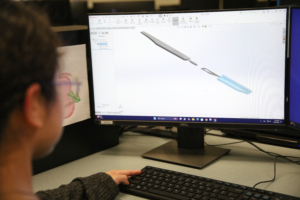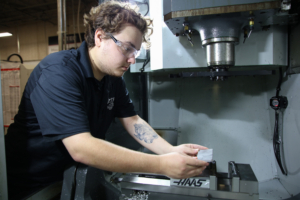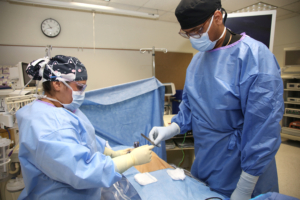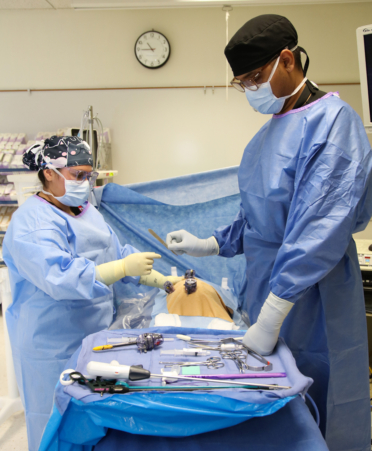(HARLINGEN, Texas) – At Texas State Technical College’s Harlingen campus, the journey of a surgical scalpel is more than just metalwork.
It is an example of how collaboration among three TSTC technical programs turns precision into purpose — demonstrating how students are preparing to play a vital role in saving future lives.
The journey begins with a concept developed in the Drafting and Design program. Along the way, it takes shape through the skills of students in the Precision Machining Technology program. It culminates with Surgical Technology students using the finished surgical scalpel during hands-on labs.

“This project pushes our students to grasp the importance of how precision works when dealing with extremely tight tolerances in small-scale designs,” said Samuel Pizano, a Drafting and Design instructor. “By designing a surgical scalpel, they are contributing to something that could one day help save lives.”
Francisco Garcia, a Precision Machining Technology instructor, emphasized that attention to detail and accuracy are important in any project as it helps students sharpen their technical skills.
“They’re learning how to develop reverse engineering skills,” he said. “Students use their knowledge to design a surgical scalpel, apply their skills using a 3D-printed prototype and manufacture it using Mastercam software and a computer numerical control machine.”

Garcia noted that the program is designed to prepare students to become well-rounded machinists.
“Our students take great pride in the quality of their work,” he said. “Regardless of the industry they serve, they are driven by the opportunity to make a meaningful impact.”
Yolanda Ramirez, program team lead for the Surgical Technology program, said using a surgical scalpel provides students with a realistic experience that deepens their understanding of the medical environment.

“It helps them focus on hand-eye coordination while reinforcing proper handling techniques and safety awareness,” she said. “Working with real instruments like a surgical scalpel builds muscle memory and confidence, which are essential for success in the operating room.”
It is important for surgical technologists to understand how medical instruments are manufactured. This knowledge gives them a greater appreciation for the instruments’ quality, function and purpose. It also enables them to advocate for patient safety.
Registration for TSTC’s fall semester is underway. For more information, go to tstc.edu.
